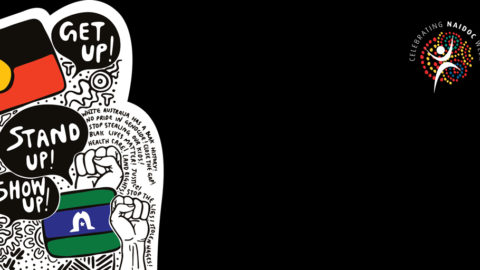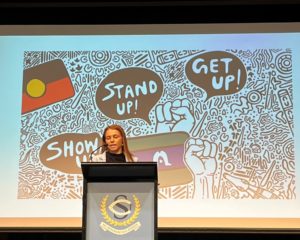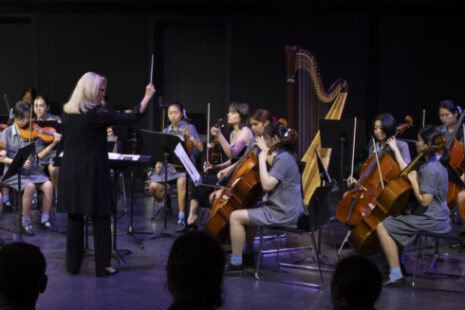NAIDOC Week 2022

NAIDOC Week provides us with the opportunity to recognise and celebrate the history, culture, and achievements of Aboriginal and Torres Strait Islander peoples.
In addition to paying our respect in meetings and our weekly assemblies in the form of the Acknowledgement of Traditional Owners, recognition of important dates such as Reconciliation Day and NAIDOC Week are undertaken in Assemblies, through the curriculum and activities.
These days of recognition provide students with the chance to learn more about First Nations cultures and to celebrate the oldest, continuous living cultures on earth. Importantly, they serve as a reminder that this respect for culture should exist every day. This year’s NAIDOC theme is ‘Get up, Stand up, Show up,’ urging a united effort to bring about systemic change.

NAIDOC Week Assembly Guest Speaker, Samantha Bice from the Korin Gamadji Institute discussed her journey as an Indigenous woman.
In this week’s NAIDOC Assembly, the Year 12 Executive invited guest speaker Samantha Bice from the Korin Gamadji Institute to talk about her journey as an Indigenous woman and what NAIDOC Week means to her. Samantha began her speech by linking her experience to the 2022 St Catherine’s theme word ‘Emerge’. Samantha explained that Korin Gamadji means ‘grow and emerge’ in Woiwurrung, the language of the Wurundjeri people.
In 2011, these words were gifted to the Richmond Football Club by Wurundjeri Elders and the Korin Gamadji Institute, a centre for cultural strength and learning for Indigenous youth, was born.
Samantha shared her own journey as a football player and captain in regional clubs before moving to Melbourne to further her passion for leadership of Indigenous girls, not only in sport but across a broad realm of pursuit and opportunity. She noted that she has taken some time to find ‘her place’ and is keen to help others do the same.
Providing further context for NAIDOC Week, Student Executive members Ciara Jenkins and Arabella Llewelyn explained the background to the statement of support for Aboriginal and Torres Strait Islanders in our Constitution. The Uluru Statement from the Heart represents the historic consensus of Indigenous leaders in seeking constitutional change to recognise First Australians through a Voice to Parliament.
Arabella and Ciara explained that following the First Nations National Constitutional Convention, that brought together 250 Indigenous representatives from across the country, the Uluru Statement was issued on the 26 May 2017. They also noted the significance of the Uluru Statement as it represents the first time the matter of constitutional recognition has reached an agreement after years of debate from both Indigenous and non-Indigenous Australians.
The Uluru Statement is an invitation from the Aboriginal and Torres Strait Islander peoples to “walk with us in a movement of the Australian people for a better future.” It calls for structural reforms including constitutional change to establish a Voice to Parliament enshrined in the Constitution; empowering Aboriginal and Torres Strait Islanders to have a say on the laws and policies that impact them.
In keeping with this year’s NAIDOC theme, ‘Get up, Stand up, Show up,’ Ciara and Arabella urged students and staff to “come together to deliver real change for Aboriginal and Torres Strait Islander peoples” before showing this video from Midnight Oil.
The St Catherine’s Statement of Commitment to the Cultural Safety of Aboriginal Students can be found on the School website, in the Child Safety and Wellbeing Policy and shared below. As part of our commitment to establishing a culturally safe environment for all students, the School has a Reconciliation Action Plan (RAP) Committee and a ‘Plan of Action to Implement Cultural Safety of Aboriginal and Torres Strait Islander Peoples.’ The New Child Safe Standards include an increased focus on safety for Aboriginal children and young people and Child Safe Standard 1 states that schools must establish a culturally safe environment in which the diverse and unique identities and experiences of Aboriginal children and young people are respected and valued.
Establishing a Culturally Safe Environment
Statement of Commitment to the Cultural Safety of Aboriginal Students
St Catherine’s School and Boarding House is committed to creating a culturally sensitive and safe environment for all students and we respect the unique identities and experiences of Aboriginal and Torres Strait Islander students.
St Catherine’s is committed to ‘Closing the Gap’ and acknowledges Australia is a nation of great diversity, and an ancient land that has been cared for by Indigenous Australians for many thousands of years. The School accepts that it has a shared responsibility to support children, families, colleagues, and the local community to understand, respect and value diversity and the strengths of Aboriginal culture, values, and practices.
We recognise the link between Aboriginal culture, identity and safety and actively create opportunities for Aboriginal students and the Aboriginal community to have a voice and presence in our School planning, policies, and activities.
Strategies to promote cultural safety in our School community include the School’s Reconciliation Action Plan, which outlines the implementation of the School’s aims to create an inclusive and welcoming physical and online environment for Aboriginal children and their families, to encourage students to express their culture and cultural rights, and to educate all students in Aboriginal and Torres Strait Islander history and cultural rights. Other measures include staff training in cultural competence and developing links with local elders, Aboriginal organisations, and families.




